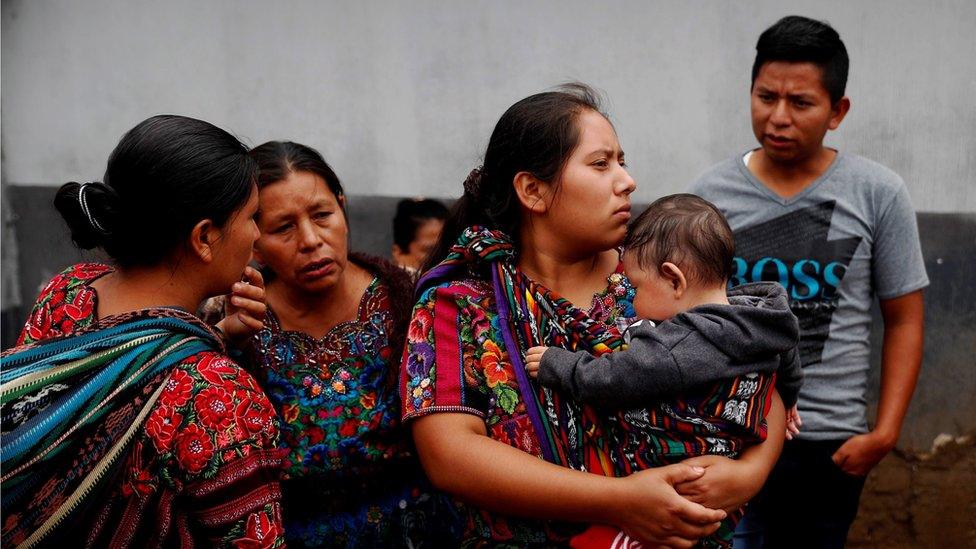Guatemala signs migration deal with US after Trump threats
- Published

A family in Guatemala waits for a relative deported from the United States
The US and Guatemala have signed a migration agreement, days after US President Donald Trump threatened the Central American country with tariffs.
Under the deal, migrants from El Salvador and Honduras who pass through Guatemala would be required to stop and seek asylum there first.
Migrants who failed to do so would then be ineligible for asylum in the US.
Mr Trump said that in exchange Guatemalan farm workers would get easier access to work on US farms.
The Guatemalan government says the agreement will last for two years, and will be reviewed every three months.
It said neither side was obliged to make any funding available under the plan.
Guatemala's President Jimmy Morales had been due to sign a deal with Mr Trump last week, when the Guatemalan Constitutional Court ruled he could not sign without approval from Congress.
Mr Trump responded by threatening Guatemala with tariffs and other sanctions after the country's high court issued its order blocking the agreement.
"We were ready to go. Now we are looking at the 'BAN' ... Tariffs, Remittance Fees, or all of the above. Guatemala has not been good. Big US taxpayer dollars going to them was cut off by me 9 months ago," Mr Trump wrote on Twitter.
A tax on Guatemalan remittances would have posed a significant threat the nation's economy. Guatemalan nationals living abroad sent back $9.5 billion (£7.4bn; €8.2bn) in 2018 - 12% of the country's GDP, according to the World Bank.
It was not immediately clear how the deal had been reached, given the Constitutional Court's ruling.
Details of the deal are unclear as well. In a change from earlier statements, the Guatemalan government did not refer to it as a "safe third-country agreement".
Under such an agreement any asylum seekers who travel through a "safe country" on their way to the US must be returned to that country to request US asylum.
As a result of such a deal, Guatemalans and Mexicans would be the only Latin American migrants able to seek protection at the US-Mexico border.
Under the 1951 UN Refugee Convention, refugees are not obliged to claim asylum in the first "safe country" they reach.
Asylum seekers who enter a country illegally are also protected from prosecution under Article 31 of the Convention.
The sanctions threats issued by Mr Trump echoed his treatment of Mexico. Last month he said he would impose steadily increasing tariffs - starting at 5% and climbing to 25% - if it did not take greater steps to stem migration to the US.
Mr Trump said he abandoned the tariffs when Mexico agreed to strengthen patrols on the border.
Guatemala, as well as its southern neighbours El Salvador and Honduras, has been struggling to curb the flow of people leaving for the US.